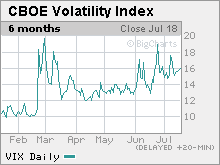Safe havens for risky timesAs volatility increases, it may be a good time for investors to take a closer look at investments that hold up well when the market is challenged.LONDON (CNNMoney.com) -- With stocks hitting new peaks, it may seem counterintuitive to focus attention on more conservative investments. But safe-haven investments are growing more appealing to some analysts, who say the market has gotten ahead of itself and is due for a correction.
A lot of people have been "taking profit off the table and paring back their exposure to high-risk areas," including emerging markets like China and Latin America, said Tom Roseen, a senior research analyst at mutual fund research firm Lipper. Volatility, as measured by the Chicago Board Options Exchange Volatility Index, has also been rising - which means sharper movements in the market are likely. Investors shouldn't overhaul their portfolio in an attempt to time market swings. The key to success with any portfolio is keeping it diversified through asset allocation, analysts say. But given the uncertain outlook for the economy and interest rates, investors may want to reconsider investments that traditionally hold up well when the stock market is challenged. "Investors are going to start to price risk as they have in the past, and as risk gets more appropriately priced, you want to own the safest assets," said Mark Coffelt, president and chief investment officer of Empiric Funds. Here's what to consider. Think big, go global It's impossible to know when the market will pull back, but investors can protect themselves for when it happens by staying away from riskier stocks. While small and midcaps have performed well over the last several years, larger cap companies tend to be more stable in times of uncertainty, said Scott Neuendorf, an equity analyst with Hester Capital Management. Coffelt from Empiric Funds likes large cap companies with a presence overseas. These firms not only benefit from the global growth, they also are well positioned to benefit from the falling dollar, he said. "They produce earnings and profits in other currencies and so as a U.S. investor, you're essentially betting the dollar will be stable or continue to be weak - and that's been a pretty good bet," he said. The dollar has fallen against a broad basket of currencies and is currently at a record low against the euro and a 26-year low versus the British pound. Many currency strategists are forecasting more weakness for the greenback. Coffelt's picks include Coca-Cola FEMSA (Charts), the Coke bottler for Mexico and South America. He also likes beer bottler and producer Compania Cervecerias Unidas (Charts) and French insurer AXA (Charts). Treasury bonds Short of stuffing your money under the mattress, there isn't a much safer investment than Treasury bonds - one of the reasons why they're usually the first place investors turn when they want to flee risk. For instance, when Fed Chairman Ben Bernanke warned about housing and inflation on Wednesday, Treasury prices jumped as his comments rattled investors who then sought refuge in bonds. One of the easiest ways to invest in Treasurys is through mutual funds or exchange-traded funds, since they're easy to buy and don't require the lump sum you would need to go out and buy the security directly, according to Tom Roseen, a senior research analyst at mutual fund research firm Lipper. For some of the best mutual funds you can buy, check Money Magazine's list of recommended funds. Investors are better off sticking to short- or intermediate-term bonds for now, Roseen said. "Longer maturities are more volatile, especially with everyone expecting inflation to rise," he said. Inflation erodes the value of fixed-interest paying investments like bonds. Cash The stock market isn't going to crash, but the next few years will likely be difficult, said Paul Nolte, director of investments at Hinsdale Associates, a money management firm. "The combination of still historically high valuations, rising interest rates and rising energy prices is a formula that provides for below average rates of return for stocks over the next three to five years," he said. As a result, he's been building up his cash position to 5 to 10 percent over the last year. That's up from the 1 to 2 percent position he usually prefers to hold. With the fed funds rate at 5.25 percent, it's fairly easy to find a high-yield savings account paying 5 percent, according to Peter Crane, president of Crane Data, a firm that tracks money market mutual funds and other cash investments. The fed funds rate is an overnight bank lending rate that influences other rates. Besides offering a pretty attractive yield, cash is easy to access and offers investors flexibility during times of uncertainty. Nolte's holding his cash mainly in short-term Treasury bills, but everyday investors looking to beef up their cash reserves will probably want to opt for money market mutual funds or bank savings accounts. |
|

